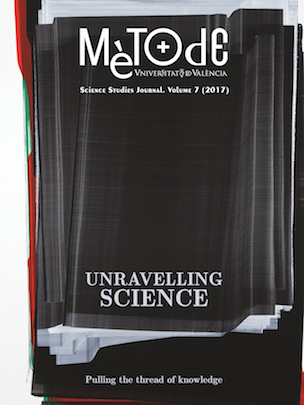An open path for gender equality in research: When women scientists question the state of science and the institutions embrace the criticism
DOI:
https://doi.org/10.7203/metode.7.8187Palabras clave:
feminist theory, Horizon 2020, research, gender studies, androcentrism Resumen
Resumen
The institutionalisation of equality policy in science, both at the national and the European scale, should facilitate progress towards equality in a space that wants to consider itself merit (and ability) driven. But discriminatory practices, both conscious and unconscious, direct or indirect, leave women out of many of the positions that they should occupy according to their accomplishments and capabilities. Many scientific institutions and their professionals still do not understand that if gender equality is only formally achieved and actual compliance is not monitored, they will lose part of the talent they are trying to cultivate.
 Descargas
Descargas
 Citas
Citas
Barral, M. J., Magallón, C., Miqueo, C. & Sánchez, M. D. (Eds.). (1999). Interacciones ciencia y género. Discursos y prácticas científicas de mujeres. Barcelona: Icaria.
Durán, M. A. (1981). Sobre la posibilidad de un conocimiento no sexista. In M. A. Durán (Ed.), Liberación y utopía (pp. 7–33). Madrid: Akal.
European Commission. (2016a). Open innovation, open science, open to the world. A vision for Europe. Luxembourg: Publications Office of the European Union. doi: 10.2777/061652
European Commission. (2016b). She figures 2015. Gender in research and innovation. Luxembourg: Publications Office of the European Union. doi: 10.2777/744106
Fausto-Sterling, A. (2000). The five sexes, revisited. Sciences, 40(4), 18–23. doi: 10.1002/j.2326-1951.2000.tb03504.x
Haraway, D. (1991). A cyborg manifesto: Science, technology, and socialist-feminism. In Simians, cyborgs and women: The reinvention of nature (pp. 149–181). New York, NY: Routledge. doi: 10.1007/978-1-4020-3803-7_4
Harding, S. (1991). Whose science? Whose knowledge?: Thinking from women’s lives. New York, NY: Cornell University Press.
Harding, S. (1996). Ciencia y feminismo. Madrid: Morata. (Original work published in 1986).
Keller, E. F. (2002). Making sense of life: Explaining biological development with models, metaphors, and machines. Cambridge, MA: Harvard University Press.
Kuhn, T. S. (2013). La estructura de las revoluciones científicas (C. Solís, Trad.). Mexico: Fondo de Cultura Económica. (Original work published in 1962).
Lipinsky, A. (2014). Gender equality policies in public research. Based on a survey among members of the Helsinki Group on Gender in Research and Innovation, 2013. Retrieved from http://ec.europa.eu/research/pdf/199627_2014%202971_rtd_report.pdf
Longino, H. (1993). Subjects, power and knowledge: Description and prescription. In L. Alcoff (Ed.), Feminist philosophies of science in feminist epistemologies (p. 101–120). New York, NY: Routledge.
Maturana, H., & Varela, F. (2007). El árbol del conocimiento. Santiago de Chile: Editorial Universitaria.
Pérez Sedeño, E., & Canales Serrano, A. F. (2013). Educación superior e investigación científica: Historia, sociología y epistemología. In C. Díaz Martínez, & S. Dema Moreno (Eds.), Sociología y género (pp. 228–252). Madrid: Tecnos.
Resolution on women’s careers in science and universities, and glass ceilings encountered. (2015). Retrieved from http://www.europarl.europa.eu/sides/getDoc.do?pubRef=-//EP//TEXT+REPORT+A8-2015-0235+0+DOC+XML+V0//EN
Sánchez, A. (1993). El debate sobre la selección sexual: Complejidad versus determinismo. Arbor, 144(565), 141–172.
Schiebinger, L. (2013). Gendered innovations. How gender analysis contributes to research. Luxemburgo: Publications Office of the European Union. Retrieved from http://ec.europa.eu/research/science-society/document_library/pdf_06/gendered_innovations.pdf
Schiebinger, L., & Schraudner, M. (2011). Interdisciplinary approaches to achieving gendered innovations in science, medicine and engineering. Interdisciplinary Science Reviews, 36(2), 154–167. doi: 10.1179/030801811X13013181961518
Descargas
Publicado
Cómo citar
-
Resumen1395
-
PDF 823
-
2
Número
Sección
Licencia
![]()
Todos los documentos incluidos en OJS son de acceso libre y propiedad de sus autores.
Los autores que publican en esta revista están de acuerdo con los siguientes términos:
- Los autores conservan los derechos de autor y garantizan a Metode Science Studies Journal el derecho a la primera publicación del trabajo, licenciado bajo una licencia de Creative Commons Reconocimiento-NoComercial-SinObraDerivada 4.0 Internacional, que permite a otros compartir el trabajo con un reconocimiento de la autoría del trabajo y citando la publicación inicial en esta revista.
- Se permite y se anima a los autores a difundir sus trabajos electrónicamente a través de páginas personales e institucionales (repositorios institucionales, páginas web personales o perfiles a redes profesionales o académicas) una vez publicado el trabajo.





